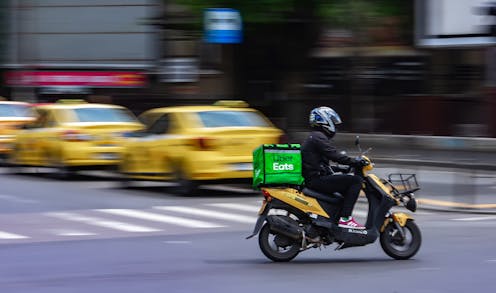Gig economy workers set for new protections in Albanese government's legislation introduced next week
- Written by Michelle Grattan, Professorial Fellow, University of Canberra

A suite of protections for gig workers will be contained in legislation to be introduced into parliament by Workplace Relations Minister Tony Burke next week.
The government argues the changes balance protections with work flexibility. The new regime will begin from July 1.
The legislation, called the Closing Loopholes Bill, will also include measures on rights for casual workers, stopping wage theft, and preventing companies with enterprise agreements using labour hire to undercut wages.
Business has been campaigning strongly against the new round of industrial relations legislation.
Under the changes, the Fair Work Commission will set minimum standards for “employee-like workers” in the gig economy. These are people who work through a digital labour platform, notably in food delivery, ride share and the care economy.
Businesses will be able to apply to the commission for minimum standards orders tailored to the work performed under them.
The terms the commission will be able to consider for an order include payment, record keeping and insurance. But it would not set minimum standards on overtime rates, rostering, or terms that would change how a worker is engaged.
These workers will also be protected from being unfairly removed from digital labour platforms, and they will be able to ask the commission to resolve disputes.
The government says the changes will allow the commission to respond flexibly to these new, quickly evolving business models.
It stresses they will not affect independent contractors, such as skilled tradespeople, who have a high-degree of autonomy over their work. Rather, they are aimed at protecting workers who are neither “employees” nor small businesses.
Gig workers are estimated to number in the hundreds of thousands.
Burke said at least 13 gig workers have died on the roads in the last few years.. “We know there is a direct link between low rate of pay and safety: it leads to a situation where workers take risks so they can get more work because they’re struggling to make ends meet,” he said.
“We can’t continue to have a situation where the 21st century technology of the gig platforms comes with 19th century conditions.
"At the moment if you’re classed as an employee you have a whole lot of rights such as sick leave, annual leave and minimum rates of pay. If not, all those rights fall off a cliff. What we want to do is turn the cliff into a ramp.
"We’re not trying to turn people into employees when they don’t want to be employees. But just because someone is working in the gig economy shouldn’t mean that they end up being paid less than they would if they’d been an employee.”

















